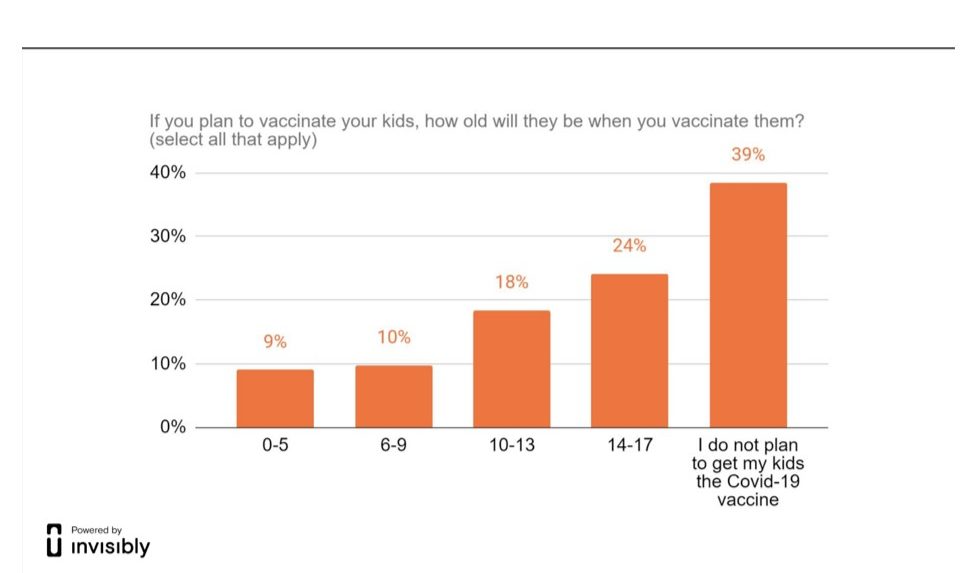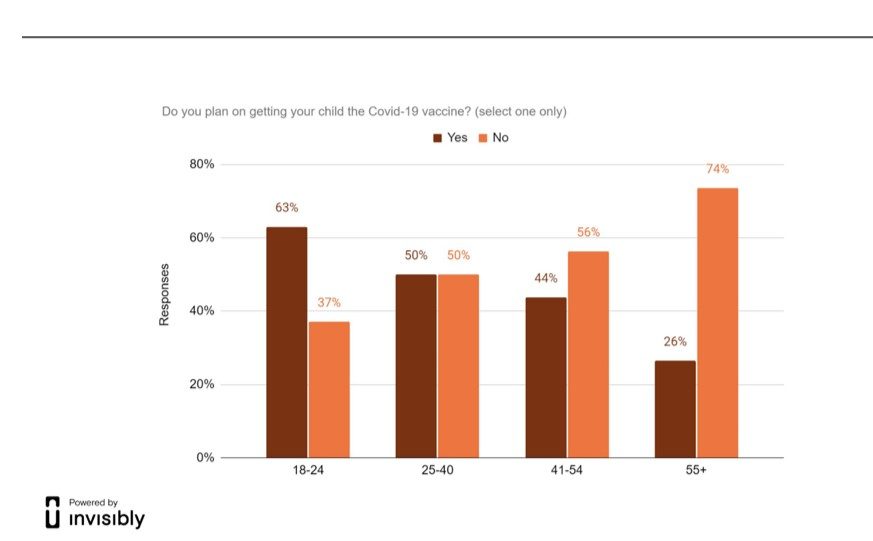Most parents in a new survey said no to immediately getting their kids vaccinated against COVID-19.
The survey by Invisibly found 74% of parents will either wait or not vaccinate their kids against the coronavirus. Only 26% of parents said they will have their children inoculated right away, 41% will wait a few months and 33% will not have their kids vaccinated.
Invisibly conducts real-time polling to harness data. The firm surveyed 1,258 parents nationally from March 25 to 29, asking them if and when they’d get their kids vaccinated. It also asked the ages of the children and parents.
Invisibly Realtime Research surveys appear on web pages in place of ads. They are optional, ensuring voluntary participation.
Laura Vestal, vice president of marketing at Invisibly, said the vaccine is a hot topic, especially when it comes to children.
“Parents are extremely cautious when it comes to their kids,” Vestal said.
The survey results come as the FDA this week approved emergency use authorization of the Pfizer vaccine for children ages 12 to 15. The approval is just in time for students to be vaccinated before starting in-person learning in the fall.
The American Academy of Pediatrics (AAP) states that Pfizer’s vaccine is “safe and 100% effective” for this age group.
Pfizer will seek FDA vaccine approval for children ages 2-11 in September, and for ages six months to 2 years later this year, AAP states. Moderna is also doing clinical testing with children ages 6 months through 17 years.
AAP has pushed for pediatric vaccines as more than 3.85 million children nationally have tested positive for COVID as of May 6. More than 14,849 children have been hospitalized and at least 297 children have died from the virus. Children represent 14% of the country’s COVID cases with 5,121.5 cases per 100,000 children, AAP states.
President Joe Biden said he is challenging states to vaccinate as many adolescents as possible by July 4. In addition to regular vaccination sites, vaccines for children will be available through pediatricians and family physicians.
But parents remain concerned about the newness of COVID vaccines as well as possible side effects, Vestal said. Although she couldn’t wait to get the vaccine for herself, Vestal said she is hesitant about having her 3- and 7-year-olds receive it.
“It’s also what’s happening in the news,” she said. “With the pausing of the Johnson & Johnson vaccine, the first thing that came to my mind was…if my kids had it, I would’ve been nervous.”
Invisibly’s survey found the age of kids played a big role in parents’ willingness to have them vaccinated, with parents being more concerned about side effects on younger children. About 9% of parents are willing to have children from newborns up to age 5 vaccinated, Vestal said, while 24% of parents are willing to have children ages 14-17 receive the shot.

The age of parents also played a big role. The younger the parents, the survey showed, the more willing they were to vaccinate their kids. Sixty-three percent of parents ages 18-24 were in favor of it, while 74% of parents over 55 said they didn’t want to have their kids vaccinated, Vestal said.

The national survey appears to mirror the views of many South Bay residents.
San Jose residents said on Nextdoor that even if they were immunized themselves, they are not comfortable giving their children the COVID vaccine. Some, like Valery An Joaquim, expressed concerns with the lack of a long-term study of side effects.
Sogol Matin, 36, who has three kids under 5 years old, said COVID-19 vaccines are unnecessary for kids due to the high survival rate and low infections in children from COVID.
“My kids are fully vaccinated for all mandatory vaccines,” Matin said. “However, I will not vaccinate my kids with this experimental COVID-19.”
Some residents are undecided. Joy Etraude said she may wait as her children are both under 6 years old.
“I would not want them to have the same reaction I did when I got mine,” Etraude said.
Kryis Lindseth Reed, 49, said she will wait to have her 10-year-old daughter and 12-year-old son vaccinated until she sees what side effects children in those age groups suffer.
“I want to know more before deciding,” she said, “but I am not against vaccines.”
But others like Deneen Marie want their children vaccinated right away.
“Why would you want your child to get sick with something that could have been avoided?” she said.
Kids or not, vaccine hesitancy is not uncommon in Silicon Valley.
Newly-released data shows one in 10 Santa Clara County residents are refusing a COVID-19 vaccine due to fear of side effects or safety concerns, misinformation and scheduling issues—a problem that county health officials are quickly trying to ameliorate.
The top three reasons why county residents are saying no to vaccines are fear of side effects or safety concerns, not having done enough research and not having enough time or availability, the survey found.
Erin Fitzgerald said she understands people’s hesitancy, but contracting the virus can result in cognitive dysfunction, shortness of breath, fatigue, muscle pain, headaches, dizziness and more.
“Well after the virus has cleared,” she said, “some cannot walk without getting winded, and even simple tasks like brushing hair can be exhausting. I will vaccinate my child.”
Contact Lorraine Gabbert at [email protected].



Leave a Reply
You must be logged in to post a comment.